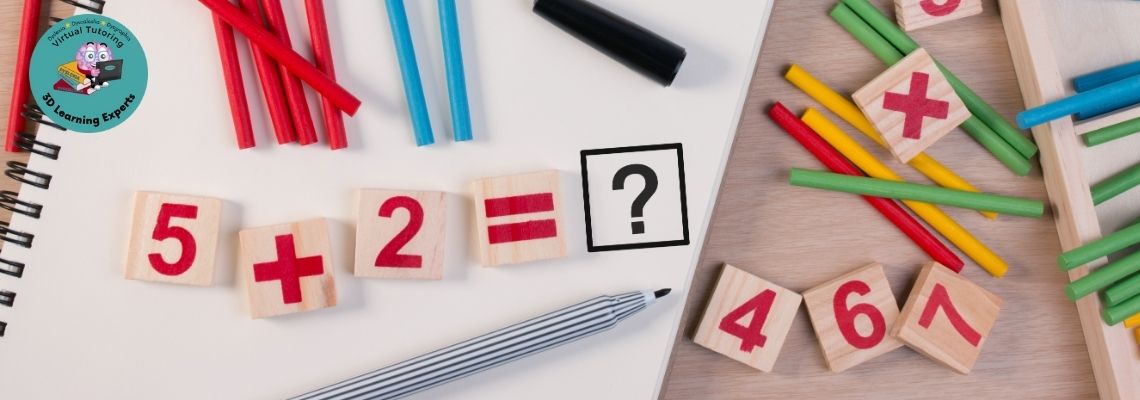Many parents and teachers assume that when a child says they hate math or struggles with it, it’s due to a lack of effort, focus, or motivation. However, for some kids, their difficulties stem from a neurological learning difference called Dyscalculia—not laziness. Dyscalculia is a specific learning disability that affects a person’s ability to understand numbers and mathematical concepts. Recognizing the signs can help children receive the right support and overcome their challenges in math.
What Is Dyscalculia?
Dyscalculia is a learning disability that affects number sense, mathematical reasoning, and problem-solving. It’s often compared to Dyslexia, but while Dyslexia affects reading and language processing, Dyscalculia impacts how the brain processes numbers and mathematical relationships.
Children with Dyscalculia struggle with:
- Recognizing numbers and their values
- Understanding basic arithmetic operations (addition, subtraction, multiplication, and division)
- Telling time and using a clock
- Grasping measurement concepts, such as weight or distance
- Understanding sequences and patterns
- Memorizing math facts, such as multiplication tables
Without the right support, your child may feel frustrated, develop low self-esteem, and struggle to keep up in school.
Why Kids With Dyscalculia Might Hate Math
Children with with this learning challenge may avoid math homework, feel anxious about tests, or believe they are simply “bad at math.” This can lead to frustration and self-doubt, especially if their struggles are mistaken for a lack of effort. The reality is that their brains process numbers differently, making it harder to grasp numerical relationships and perform calculations.
Some common reasons why kids struggle include:
1. Difficulty Understanding Number Concepts
Numbers are abstract symbols, and children with Dyscalculia may have trouble associating them with real-world quantities. For example, they may not instinctively know that “5” is larger than “3” or struggle to visualize how numbers fit together.
2. Challenges With Memorization
Many math skills require memorization, such as math facts, formulas, and multiplication tables. Dyscalculic learners often struggle with rote memorization, making it hard to recall math facts quickly.
3. Problems With Sequencing
Math relies heavily on following steps in a particular order, such as long division or solving multi-step equations. A child struggling with math may lose track of steps or struggle to follow a sequence correctly.
4. Spatial and Directional Difficulties
Understanding spatial relationships is important in math, especially with geometry, fractions, and word problems. Dyscalculia can make it hard for kids to align numbers correctly, misinterpret graphs, or struggle with spatial reasoning tasks.
5. Math Anxiety and Low Confidence
Because they struggle more than their peers, children with Dyscalculia often develop math anxiety. They may avoid math-related activities, feel embarrassed in class, or assume they’re just “not good at math,” which further impacts their confidence and willingness to try.
How Multi-Sensory Learning Can Help Kids With Learning Challenges
The good news is that Dyscalculia does not mean a child is incapable of learning math—it just means they need alternative strategies and extra support. Multi-sensory learning is one of the most effective approaches for children with Dyscalculia, as it engages multiple senses to reinforce concepts.
Multi-sensory math instruction includes:
- Hands-on activities – Using manipulatives like counting blocks, number lines, and base-ten blocks to build number sense.
- Visual aids – Incorporating charts, diagrams, and color-coded steps to break down complex problems.
- Auditory reinforcement – Using songs, chants, or verbal cues to help with math fact memorization.
- Kinesthetic learning – Encouraging movement-based activities, such as tracing numbers in sand or using interactive math games.
The Benefits of Online Tutoring for Math
For children who struggle with math, one-on-one tutoring can provide the individualized support they need. Online tutoring with multi-sensory methods allows students to work at their own pace in a structured, supportive environment.
With an experienced online tutor, children with Dyscalculia can:
✔ Receive personalized instruction tailored to their learning style
✔ Use interactive tools like digital whiteboards and math manipulatives
✔ Build confidence through positive reinforcement and encouragement
✔ Reduce math anxiety by learning in a stress-free environment
✔ Strengthen foundational skills before moving on to more complex concepts
FAQs About Dyscalculia
Q: Is Dyscalculia the same as being bad at math?
A: No. While many kids struggle with math at some point, Dyscalculia is a recognized learning disability that affects how the brain processes numbers. It’s not a matter of effort or intelligence.
Q: Can Dyscalculia be diagnosed?
A: Yes. A formal diagnosis is typically made through a psychoeducational evaluation conducted by a specialist, such as an educational psychologist.
Q: Can kids outgrow Dyscalculia?
A: Dyscalculia is a lifelong condition, but with the right support and strategies, children can improve their math skills and build confidence.
Q: How is online tutoring different from in-person tutoring for Dyscalculia?
A: Online tutoring provides flexibility, interactive tools, and individualized attention without the need for travel. Multi-sensory online methods make learning engaging and effective.
Give Your Child the Math Support They Need
If your child struggles with math, they’re not lazy—they just need the right approach. Multi-sensory tutoring can make math less overwhelming and more engaging. Our expert tutors specialize in Dyscalculia-friendly instruction, helping kids build confidence and succeed in math.
Ready to help your child thrive in math? Schedule a free consultation today!

